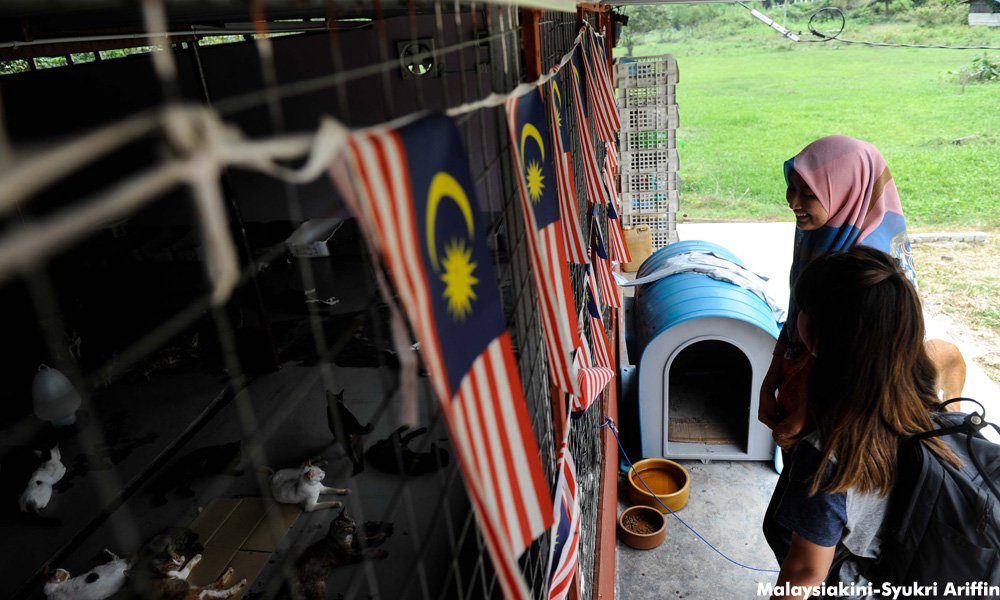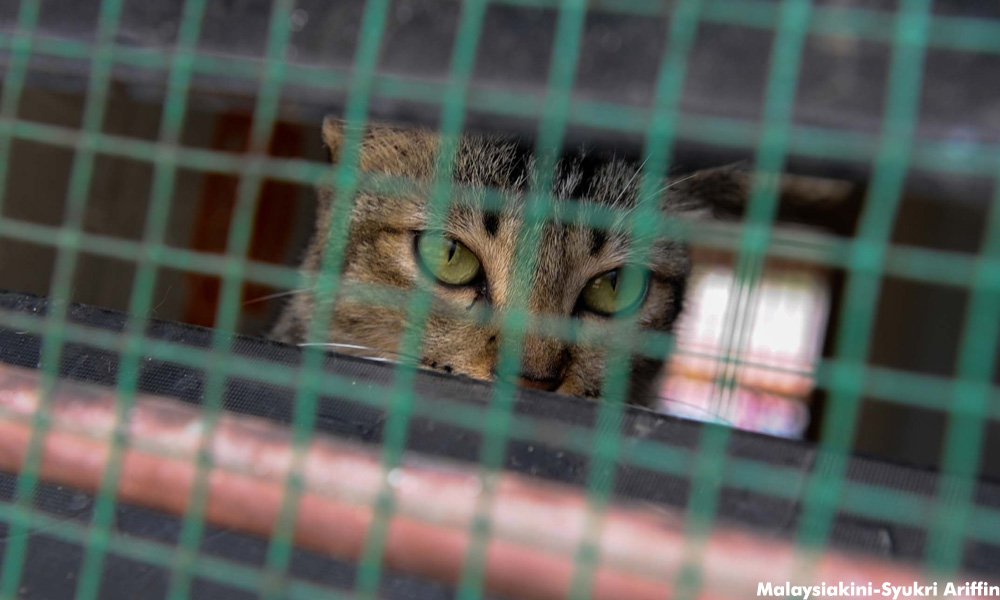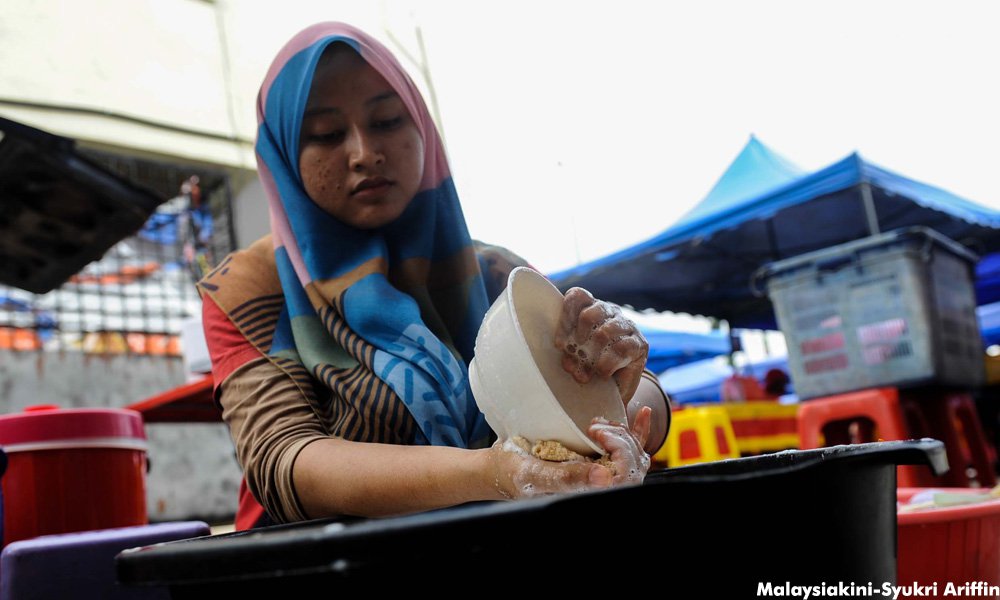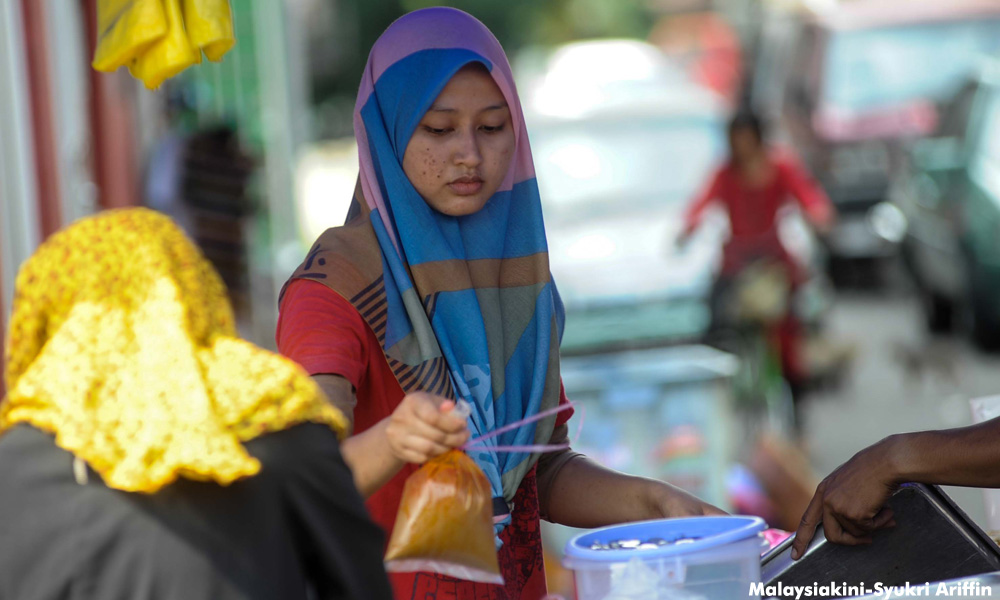Norashikin Ahmad, 24, has been rescuing dogs and cats ever since 2014 when she got her first job. She houses 120 cats and 50 dogs in a purpose-built shelter next to her home in Alor Gajah, Malacca.
On top of running the shelter, she works full-time, helps out with her mother’s food business and has to travel to the mosque in the next village to pray as she is not welcome at the one right outside her house.
We first meet Shikin (as she is commonly known) at the Alor Gajah morning market where she works at her mother’s food stall on Sundays.
After the market, we follow her to a small village off the main road. There are several buildings on her property but none that look, or smell, like an animal shelter.

Shiro, a tiny scrappy-looking shih tzu, straggles out to greet us.
Shikin throws Shiro a rubber ball as she points to a maroon-coloured building in front of us, “that’s my shelter!”
At the entrance of the shelter is a brown three-legged dog who hops timidly behind Shikin as we come close.
Once inside, cats climb on top of each other playfully to clamour for Shikin’s attention. The smooth cement floor is carpeted with cats in all colours, sizes and resting positions. It is hard to know where to step! In the midst of all the meowing we hear a bark. A mother and her four puppies jump up to get a glimpse of us. Their tails wag from their enclosure behind the cat carpet.
Shikin has repeatedly renovated this shelter to enlarge it. She has built another single-storey structure and is currently adding a drain and cement floor to a third. All to house her ever-growing number of rescued animals.
Besides renovation work and pet food (which costs RM3,000 a month), Shikin says its veterinary bills that cost the most.
Shikin takes several animals to the veterinarian every single day. She rarely has enough to pay the bill and as a result, she has racked up more than RM10,000 in debt.
“I never have enough money but the doctor allows delayed payments and lets me post a picture of the bill to my Facebook group to appeal for donations,” Shikin says.
Members of her Facebook group, Shikin Team Animal Rescue (STAR), regularly donate. She breathes a sigh of relief as she tells us about an anonymous donor who donated RM8,000 towards her veterinary bills just last week.
“I prefer large donations to go straight into the veterinary clinic’s account so people don’t accuse me of using the money for myself. The doctor takes a photograph of the bank statement for me to post on Facebook,” explains Shikin.

Kicked out of the house by her mother
A white house stands next to the shelter. It was built by her mother to be rented out as
It is culturally taboo for Malays to keep dogs as pets because dogs are considered unclean (or haram) in Islam.
In addition to selling food and drinks at the morning market where we met Shikin, her mother supplies nasi lemak to food stalls in Malacca during the week.
“People started boycotting her food when they found out we were keeping dogs,” says Shikin.
Her mother even stopped praying at the
The pressure became too much for Shikin’s mother to bear and as a
“She told me take my dogs and cats with me to live somewhere else.”
Only after Shikin’s older sister interfered did she change her mind.
Shikin now rents the white house from her mother to house disabled cats.
As we enter the house, Shikin calls her cats by name and they respond by brushing their bodies against her legs.
Many are crippled and blind from being run over by vehicles. One such cat could not scratch himself because he had lost his hind leg. This other cat had alimentary tract problems and could only consume liquid food, on top of being crippled. One cat developed nervous problems after she was forced by her owner to breed multiple times in a year. Another shivers uncontrollably due to Parkinson’s disease.
Cats in here thus need special care. Shikin prepares them their individual servings of food and medicine every day. She also takes a number of them to the veterinarian for weekly acupuncture appointments.

Shikin explains her daily routine.
She wakes up at
“I start work at 8.30am but I am always rushing, I am always late,” says Shikin.
On the way to work she often stops for stray cats and dogs.
“It is never my plan to rescue animals but sometimes I take a shortcut to work and there he or she will be. Maybe it was meant to happen. If I don’t stop I won’t be able to sleep at night,” she says.
During her lunch break, Shikin brings her sick animals, along with any strays she has picked up, to a veterinary clinic near her workplace.
She then returns to the clinic after work to collect her animals. Over the years the veterinarians, all
She is exhausted by the time she gets home at
Nevertheless, she is proud that many sick animals, like her disabled cats, have shown progress under her care. Most can now enjoy their food, walk about, and socialise with other cats.
“Just last week, some of the cats got too fat and broke the window panes they were resting on. I had to build them book racks to sleep on instead!” says Shikin while laughing.

Problems with the neighbours
We walk up the hill where we meet her dogs.
Shikin has little wooden dog houses dotted around her property that house individual dogs. She started rescuing dogs when she visited the Alor Gajah pound and saw how dogs were left with no water or food. Now, her work colleagues and even students at a nearby university inform her when they encounter injured stray dogs.
Dogs start emerging from dog houses and they bark excitedly at us. Like her cats, she knows them all by name.
People in her village have in the past accused her dogs of eating their chickens and goats.
“I asked them to show me proof. I asked them to show me photographs and tell me which one of my dogs did it. They could not show anything but still they went ahead to report me to the local authorities,” laments Shikin.
When the local authorities came to her property, she set all her dogs and cats free from their cages and enclosures to prove they would not run away to her neighbours’ houses. She wanted to show that the allegations against her rescues were baseless.
She also asked for proof when her neighbours complained about her cats breaking their flower pots.
“Even my dogs can’t break flower pots, their complaints are so illogical,” she says impatiently.
Like her mother, Shikin has stopped visiting the nearby surau. She travels to the mosque in the next village to pray.

Next, a world-standard animal shelter
At the end of the hill is a fenced enclosure where we meet 35 excited puppies. Yapping and yelping, they compete to squeeze under the doorway fence. Shikin is currently constructing an additional area for the puppies. Complete with a drain and cemented floors, it will give the puppies an even larger compound to run about in.
Her dream is to have an open-air shelter where dogs and cats are free to roam.
“I want to build it on a large piece of empty land and just like the shelters overseas, it will have areas for animals to play, rest and bathe. Animals will neither be in cages nor be leashed up. It will have staff and be very systematic. That is my dream,” says Shikin.
What inspired you to rescue animals in the first place? We ask.
This breaks Shikin’s determined gaze, she starts to cry.
“My inspiration, the only person who really understands me, is dad,” she struggles to continue.
As a child, Shikin spent almost all her time with her father. They could not afford to have animals at home so he would drive her to his friends’ homes just so she could play with their animals. Her earliest memory, she says, is
“He loved animals so much. He would stop his car in the middle of the road to move a monkey that had been run-over to the side,” she tells us.
Her father died of lung and heart problems five years ago, Shikin remembers the exact date and all the details of his stay at the hospital but most of all she remembers his words to her.
“He taught me that all animals are God’s creations. Dogs or cats, there is no limit to what and how we can help.”
Shikin welcomes donations, volunteer groups and adoption requests. She can be contacted at [email protected] or through private message on her Facebook page.
More from VOX KINI







